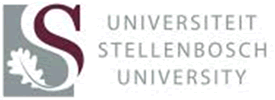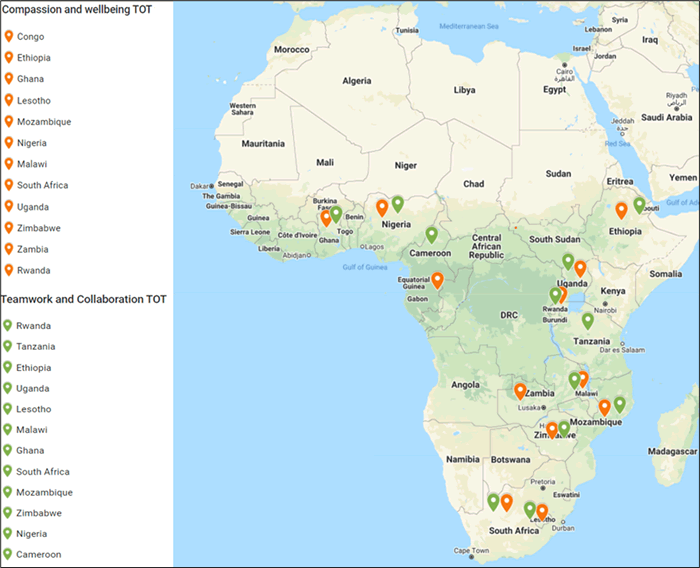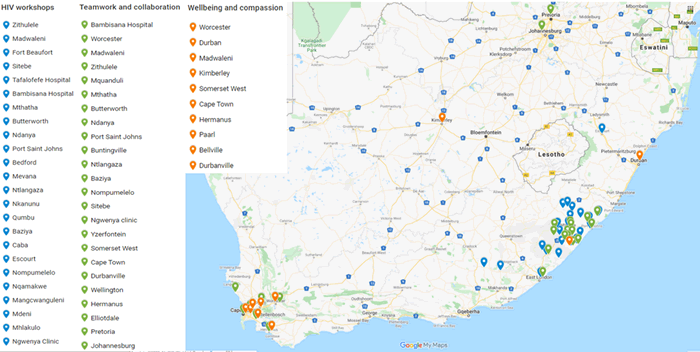 KEY PERSONNEL: Prof. Ian Couper (Co-PD), Prof. Hoffie Conradie (Co-PD and eLearning Coordinator), Ms. Suzaan Sutherland (Training Coordinator), Ms. Lindsay-Michelle Meyer (Finance Administrator)
KEY PERSONNEL: Prof. Ian Couper (Co-PD), Prof. Hoffie Conradie (Co-PD and eLearning Coordinator), Ms. Suzaan Sutherland (Training Coordinator), Ms. Lindsay-Michelle Meyer (Finance Administrator)
PROJECT TITLE: Stellenbosch University Network for Strengthening Rural Interprofessional Education for HIV (SUNSTRIPE)
PROJECT YEAR 1 RECAP: In its first year, SUNSTRIPE used a distributed approach to capacitate health care teams serving rural and underserved communities with the aim to improve the quality of HIV/AIDS services. In identifying trainees for the workshops, the team recruited health professionals already working together at a facility, thus enabling the implementation of QI projects and ensuring sustainable effects of the training on HIV patient care.
In all, 37 locally based health professionals were trained as facilitators to assist in the delivery of 8 workshops that provided training to 155 learners (65 pre-service, 90 post-graduate). The project also provided mentorship to trainees through WhatsApp group messaging and video conferencing.
In addition, SUNSTRIPE championed STRIPE HIV’s pivot to interprofessional COVID-19 training by developing a virtual workshop model and provided training-of-trainers to facilitators across the STRIPE HIV network to deliver COVID-19 training via Zoom. This enabled 1,1,145 learners (across all STRIPE HIV partners) to be trained via 32 virtual COVID-19 workshops in just three months. Of these, SUNSTRIPE trained 505 of their own learners by hosting 19 virtual workshops. This experience contributed to the team’s selection as an eLearning “start-up” partner at the start of the second year to innovate and sustain STRIPE HIV during COVID-19.
PROJECT YEAR 2 SUMMARY: SUNSTRIPE’s standout leadership during COVID-19 at the end of year 1 led to their selection as an eLearning “start-up” partner during the transition to the second year to innovate and sustain STRIPE HIV as the COVID-19 pandemic continued. During this period (July to November 2020), SUNSTRIPE expanded their virtual workshop model to four HIV modules and supported 19 facilitators to train 417 learners in virtual workshops.
At the start of the “scale up” phase of year 2, SUNSTRIPE hosted training workshops for all other STRIPE partners to train facilitators on how to use Zoom, how to facilitate interprofessional engagement virtually, and how to adapt the in-person HIV modules for a virtual workshop format.
Locally, SUNSTRIPE trained 206 learners using both the virtual workshop and online course (mix of asynchronous and synchronous activities). Participants received training on seven HIV modules as well as the new modules on ‘Compassion and Wellbeing’ and ‘Teamwork and Collaboration.” Stemming from their expertise as a start-up partner, the SUNSTRIPE team championed the development (including testing and finalization) and STRIPE-wide dissemination (including training-of-trainers; Figure 1) of these latter two modules.
Figure 1. Countries represented in the Training of trainers (TOT) participants

MAIN ACCOMPLISHMENTS
- The project delivered the following workshops: 8 HIV workshops to 139 participants, 5 Teamwork and Collaboration workshops to 83 participants, and 7 Wellbeing and Compassion workshops to 110 participants.
- Through four centrally convened training workshops, the SUNSTRIPE team trained at 133 facilitators across the STRIPE network on the virtual workshop model. Recordings of these trainings reached a total of 304 facilitators through the STRIPE HIV facilitator training course (on the AFREhealth LMS).
- The SUNSTRIPE team presented 6 papers and 4 workshops at 6 different conferences both to disseminate findings and teach the STRIPE HIV interprofessional approach. members of the SUNSTRIPE team (Francois Coetzee and Hoffie Conradie) contributed to an article entitled, “Re-imagining health professions education in the coronavirus disease 2019 era: Perspectives from South Africa,” published in the African Journal of Primary Health Care & Family Medicine (https://doi.org/10.4102/phcfm.v13i1.2948).
- A mixed-methods evaluation was completed by M&ESure. Overall successes relate to the project’s design and workshop delivery, content and structure. Learners found the quality and relevance of the workshops to be high and appreciated the opportunity for discussion. Facilitators described the use of an interprofessional team to drive the design and delivery of the workshops as a significant success factor. Almost all facilitators reported they could apply what they learned. Examples cited show application of specific teamwork and compassion/well-being principles as well as examples where facilitators embedded the STRIPE HIV approach into their teaching practices and/or shared what they have learned with education colleagues. The complete evaluation is available upon request.
CHALLENGES AND SOLUTIONS
Due to the urgency to pivot to eLearning in the project, training via the LMS was scaled early whilst the new AFREhealth LMS was still in the final stages of development. There were a number of issues with the LMS that came up for learners and facilitators that were managed as the process unfolded. Although this was a source of frustration, many issues were addressed by the end of year two and solutions will benefit future cohorts.
COLLABORATING PARTNERS
Workshops in Year 2 were made possible through collaborations with the following:
- Walter Sisulu University
- Eastern Cape Department of Health
- Northern Cape Department of Health
- Western Cape Department of Health
PARTICIPATING CINICAL SITES
Post-graduate learners in Year 2 were recruited from 34 facilities across 8 districts spanning the Eastern Cape, KwaZulu-Natal Western Cape, and Free State (Figure 2). The majority of the facilities (29) are found in 4 districts supported by PEPFAR.
Figure 2. Participant locations of the SUNSTRIPE 2021 Workshops in South Africa

IMPLEMENTATION
- Training cohorts: 2 HIV, 5 Teamwork and Collaboration, 7 Compassion and Wellbeing
- Facilitators: 14
|
Profession |
Years of experience |
Gender |
Teaching experience |
||||
|
Medical |
5 |
0-5 years |
1 |
Male |
16 |
HIV educator |
2 |
|
Nursing/Midwifery |
1 |
6-10 years |
2 |
Female |
19 |
Non-HIV educator |
6 |
|
Pharmacy |
0 |
> 11 years |
5 |
Other |
|||
|
Laboratory |
7 |
||||||
|
Other |
0 |
||||||
|
Unknown |
0 |
Unknown |
6 |
Unknown |
0 |
Unknown |
6 |
- Learners: 206
|
Medical |
Nursing/Midwifery |
Pharmacy |
Laboratory |
Other |
|
|
Postgraduate |
59 |
48 |
5 |
0 |
94 |
|
Gender |
|
|
Male |
44 |
|
Female |
157 |
|
Other |
2 |
|
Unknown |
3 |
INNOVATING HIV TRAINING DURING COVID-19:
The SUNSTRIPE team was paramount in the development and adoption of the virtual workshop format to sustain STRIPE HIV training during the COVID-19 pandemic. In addition to the synchronous training provided, the team developed two sets of guidelines to help educators with the technical aspects of Zoom and to address the principles and good practices for virtual workshops. The virtual workshop format accounted for 67% of all STRIPE HIV “scale up” eLearners in year 2.
BROADER IMPACT:
The project helped to transition Stellenbosch University staff to online training and opened the potential of Zoom and similar platforms to be used for interactive workshops. There is the possibility of incorporating some of the concepts and contents of the modules into the Postgraduate Diploma in Rural Medicine, scheduled for roll out in 2023.
Arising from the STRIPE collaboration, a pilot project to develop a community of practice in responding to COVID-19 and related stressors across South African health professions training institutions, in collaboration with AFREhealth and UKZN, is going ahead with funding from the University of New Mexico ECHO team.
Furthermore, discussions were held with the National Department of Health Knowledge Hub, the Western Cape Department of Health regional training centre, and the Eastern Cape Department of Health, to expand STRIPE HIV to other regions of South Africa. All were interested, pending availability of funding to support implementation.
Beyond the STRIPE HIV project, SUNSTRIPE utilized their networks to disseminate the STRIPE HIV ‘Teamwork and Collaboration’ and ‘Wellness and Compassion’ modules and capacitate HIV educators in organizations such as the Primary Health Care and Family Medicine (Primafamed) collaboration in Africa, Rural Rehabilitation South Africa (RuReSA), and Doctors Without Borders (MSF).
IMPACT VIGNETTES
- We discovered innovation and creativity in a global phase of fear… where everything was negative. I think the team discovered their own resilience in a way and that is something you can’t take away, not only in the Ukwanda team but across departments. – Project staff member
- The process of involving an interprofessional team as breakout group facilitators has essentially been one of informal mentoring, with additional facilitators being brought on board. – Project staff member







